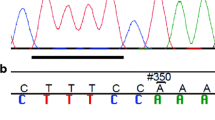Abstract
We investigated the functional effect of the missense variant c.211A>G (R71G) localized at position -2 of exon 5 donor splice site in the BRCA1 gene and evaluated whether Portuguese and Galician families with this mutation share a common ancestry. Three unrelated Portuguese breast/ovarian cancer families carrying this variant were studied through qualitative and quantitative transcript analyses. We also evaluated the presence of loss of heterozigosity and the histopathologic characteristics of the carcinomas in those families. Informative families (two from Portugal and one from Galicia) were genotyped for polymorphic microsatellite markers flanking BRCA1 to reconstruct haplotypes. Qualitative RNA analysis revealed the presence of two alternative transcripts both in carriers of the BRCA1 R71G variant and in controls. Semi-quantitative fragment analysis and real-time RT-PCR showed a significant increase of the transcript with an out of frame deletion of the last 22nt of exon 5 (BRCA1-Δ22ntex5) and a decrease of the full-length transcript (BRCA1-ex5FL) in patients carrying the R71G mutation as compared to controls, whereas no significant differences were found for the transcript with in frame skipping of exon 5 (BRCA1-Δex5). One haplotype was found to segregate in the two informative Portuguese families and in the Galician family. We demonstrate that disruption of alternative transcript ratios is the mechanism causing hereditary breast/ovarian cancer associated with the BRCA1 R71G mutation. Furthermore, our findings indicate a common ancestry of the Portuguese and Galician families sharing this mutation.




Similar content being viewed by others
References
Chenevix-Trench G, Healey S, Lakhani S et al (2006) Genetic and histopathologic evaluation of BRCA1 and BRCA2 DNA sequence variants of unknown clinical significance. Cancer Res 66:2019–2027. doi:10.1158/0008-5472.CAN-05-3546
Karchin R, Monteiro AN, Tavtigian SV et al (2007) Functional impact of missense variants in BRCA1 predicted by supervised learning. PLOS Comput Biol 3:e26. doi:10.1371/journal.pcbi.0030026
Tesoriero AA, Wong EM, Jenkins MA et al (2005) Molecular characterization and cancer risk associated with BRCA1 and BRCA2 splice site variants identified in multiple-case breast cancer families. Hum Mutat 26:495. doi:10.1002/humu.9379
Bonatti F, Pepe C, Tancred M et al (2006) RNA-based analysis of BRCA1 and BRCA2 gene alterations. Cancer Genet Cytogenet 170:93–101. doi:10.1016/j.cancergencyto.2006.05.005
Favy DA, Lafarge S, Rio P, Vissac C, Bignon YJ, Bernard-Gallon D (2000) Real-time PCR quantification of full-length and exon 11 spliced BRCA1 transcripts in human breast cancer cell lines. Biochem Biophys Res Commun 274:73–78. doi:10.1006/bbrc.2000.3100
Claes K, Vandesompele J, Poppe B et al (2002) Pathological splice mutations outside the invariant AG/GT splice sites of BRCA1 exon 5 increase alternative transcript levels in the 5′ end of the BRCA1 gene. Oncogene 21:4171–4175. doi:10.1038/sj.onc.1205520
Peixoto A, Salgueiro N, Santos C et al (2006) BRCA1 and BRCA2 germline mutational spectrum and evidence for genetic anticipation in Portuguese breast/ovarian cancer families. Fam Cancer 5:379–387. doi:10.1007/s10689-006-0009-5
Peixoto A, Santos C, Rocha P et al (2008) The c.156_157insAlu BRCA2 rearrangement accounts for more than one-fourth of deleterious BRCA mutations in northern/central Portugal. Breast Cancer Res Treat. doi:10.1007/s10549-008-9978-4
Vega A, Campos B, Bressac-De-Paillerets B et al (2001) The R71G BRCA1 is a founder Spanish mutation and leads to aberrant splicing of the transcript. Hum Mutat 17:520–521. doi:10.1002/humu.1136
Schmittgen TD, Lee EJ, Jiang J et al (2008) Real-time PCR quantification of precursor and mature microRNA. Methods 44:31–38. doi:10.1016/j.ymeth.2007.09.006
Lungu O, Wright TC Jr, Silverstein S (1992) Typing of human papillomaviruses by polymerase chain reaction amplification with L1 consensus primers and RFLP analysis. Mol Cell Probes 6:145–152. doi:10.1016/0890-8508(92)90059-7
Wu LC, Wang ZW, Tsan JT et al (1996) Identification of a RING protein that can interact in vivo with the BRCA1 gene product. Nat Genet 14:430–440. doi:10.1038/ng1296-430
King TA, Li W, Brogi E et al (2007) Heterogenic loss of the wild-type BRCA allele in human breast tumorigenesis. Ann Surg Oncol 14:2510–2518. doi:10.1245/s10434-007-9372-1
Meric-Bernstam F (2007) Heterogenic loss of BRCA in breast cancer: the “two-hit” hypothesis takes a hit. Ann Surg Oncol 14:2428–2429. doi:10.1245/s10434-007-9379-7
Honrado E, Benitez J, Palacios J (2005) The molecular pathology of hereditary breast cancer: genetic testing and therapeutic implications. Mod Pathol 18:1305–1320. doi:10.1038/modpathol.3800453
Acknowledgments
This work was supported by grant no 15/2007 awarded by Ministério da Saúde, by Liga Portuguesa Contra o Cancro-Núcleo Regional do Norte, and by Xunta de Galicia PGIDIT06BTF910101PR.
Author information
Authors and Affiliations
Corresponding author
Rights and permissions
About this article
Cite this article
Santos, C., Peixoto, A., Rocha, P. et al. Haplotype and quantitative transcript analyses of Portuguese breast/ovarian cancer families with the BRCA1 R71G founder mutation of Galician origin. Familial Cancer 8, 203–208 (2009). https://doi.org/10.1007/s10689-008-9229-1
Received:
Accepted:
Published:
Issue Date:
DOI: https://doi.org/10.1007/s10689-008-9229-1




